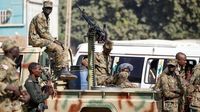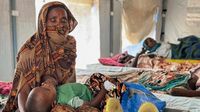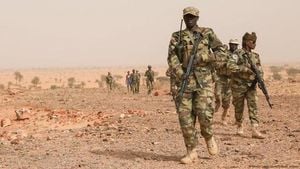For over 500 days, the city of El Fasher in Sudan’s North Darfur region has been trapped in a relentless siege, its residents squeezed by hunger, bombardment, and disease. On September 23, 2025, tragedy struck again when a drone strike by the paramilitary Rapid Support Forces (RSF) tore through the Abu Qurun station market, killing at least 15 people and injuring a dozen more. The attack, described by local resistance committees as a "massacre," marked the destruction of the last major functioning market in a city already teetering on the edge of famine and humanitarian collapse, according to reports from Sudan Tribune, AFP, and The Associated Press.
El Fasher, once a bustling hub and now the last stronghold of the Sudanese Armed Forces (SAF) in Darfur, has become a battleground in the ongoing civil war between the RSF and the military. The war, which erupted in April 2023, has killed at least 40,000 people and displaced as many as 12 million, according to the World Health Organization. Over 24 million Sudanese are now acutely food insecure, the World Food Program estimates, with El Fasher’s population among the hardest hit.
The drone strike on September 23 was not an isolated incident. Just four days earlier, the RSF had targeted a mosque near the Abu Shouk camp on the city’s outskirts, killing at least 75 people, including 11 children between the ages of six and 15, as reported by the UN children’s agency and corroborated by medical staff on the ground. The mosque attack, like the market bombing, left the community reeling and further depleted already scarce medical supplies. One medic at El Fasher hospital told AFP that staff had "run out of nearly all supplies, reduced to using bits of mosquito net instead of gauze to bandage wounds." He added, "The most painful thing is watching the wounded suffer in pain, and we don’t have the medicine to treat them."
For many, the destruction of the Abu Qurun market was a devastating blow. With El Fasher’s other main markets already destroyed in previous attacks, Abu Qurun had become a critical trading hub, its stalls filled with whatever meager goods could still make it into the besieged city. Its proximity to the Abu Shouk camp—home to thousands of internally displaced people (IDPs)—made it a lifeline for those clinging to survival on the city’s outskirts. Eyewitnesses told Sudan Tribune that the market was "completely destroyed" by the RSF’s drone strike. "There is nothing left. Every market in the city is now out of service," a resident told Radio Dabanga.
The humanitarian crisis in El Fasher has been compounded by attacks on essential infrastructure. On September 20, a UNICEF water tanker delivering clean water to patients at the Saudi hospital and to 8,500 displaced people was struck by a drone, according to a UNICEF statement. This was the third UNICEF-supported truck targeted in three months, putting both humanitarian staff and lifesaving supplies at grave risk. Following the attack, residents reported to Darfur24 that the city was cut off from all sources of water. UNICEF warned, "Without it, many will be forced to turn to unsafe sources, further exposing children to deadly waterborne disease."
That warning has already become reality. A cholera outbreak, declared in July 2024, has spread to all 18 states of Sudan, with nearly half the cases in Darfur concentrated in the Tawila area—ravaging IDP camps and threatening to engulf El Fasher. The World Health Organization reports that more than 3,000 people have died from cholera over the last 14 months of civil war. Aid organizations say the number of reported cases is rising, and with El Fasher’s water supply cut off, the risk to children and other vulnerable populations is acute.
The siege has also triggered a wave of displacement. Between September 17 and 19, at least 7,500 people fled El Fasher, most from the Abu Shouk camp, after the RSF stormed in on September 15. The RSF advanced further into the city, reaching the barracks of the SAF’s Sixth Division by September 19. The fighting has left the city’s 260,000 civilians—half of them children, according to the United Nations—trapped amid bombardment, starvation, and disease, with almost no external aid reaching them.
The RSF’s campaign in Darfur has been marked by reports of mass displacement, sexual violence, and ethnically targeted killings, especially against non-Arab groups. The Zaghawa, who form the backbone of the Joint Forces alliance supporting the army in El Fasher, have been particularly targeted, according to the United Nations and human rights groups. Refugees International has warned that "local Sudanese and international humanitarian actors on the ground warn that the same is imminent in El Fasher." Both sides in the conflict have been accused of atrocities, including ethnic cleansing, extrajudicial killings, and sexual violence against civilians, including children.
The RSF, for its part, has claimed advances in El Fasher and stated that it was evacuating "hundreds of civilians from el-Fasher," though it has provided no evidence. The group did not acknowledge the market strike on its official channels. Meanwhile, the city remains under siege, and aid agencies are struggling to reach those in need. As US Africa envoy Massad Boulos told AFP, "Hopefully, in the coming few days, we will start seeing the flow of this much-needed aid." He added, "In this case, the RSF, we’ve been talking to them, and we’ve agreed on a way to allow this humanitarian aid to go in. So it’s taking shape as we speak." Yet, for now, the reality on the ground is grim.
Medical workers and aid groups are sounding the alarm about the collapse of healthcare and basic services. With hospitals running out of supplies and clean water, and with famine closing in, the risks to civilians—especially children—are escalating by the day. The city’s resistance committees, activists who coordinate aid and document atrocities, have called the recent attacks part of a "brutal attack that comes in a series of countless repeated massacres" intended to "bring the city to its knees and break the will of its residents."
El Fasher’s fate hangs in the balance. If the RSF captures the city, it will control all of Darfur’s major population centers, a shift that could have dire consequences for the region’s civilians. For now, El Fasher’s residents endure, caught between warring sides, with the world watching and waiting for relief to break the siege.





